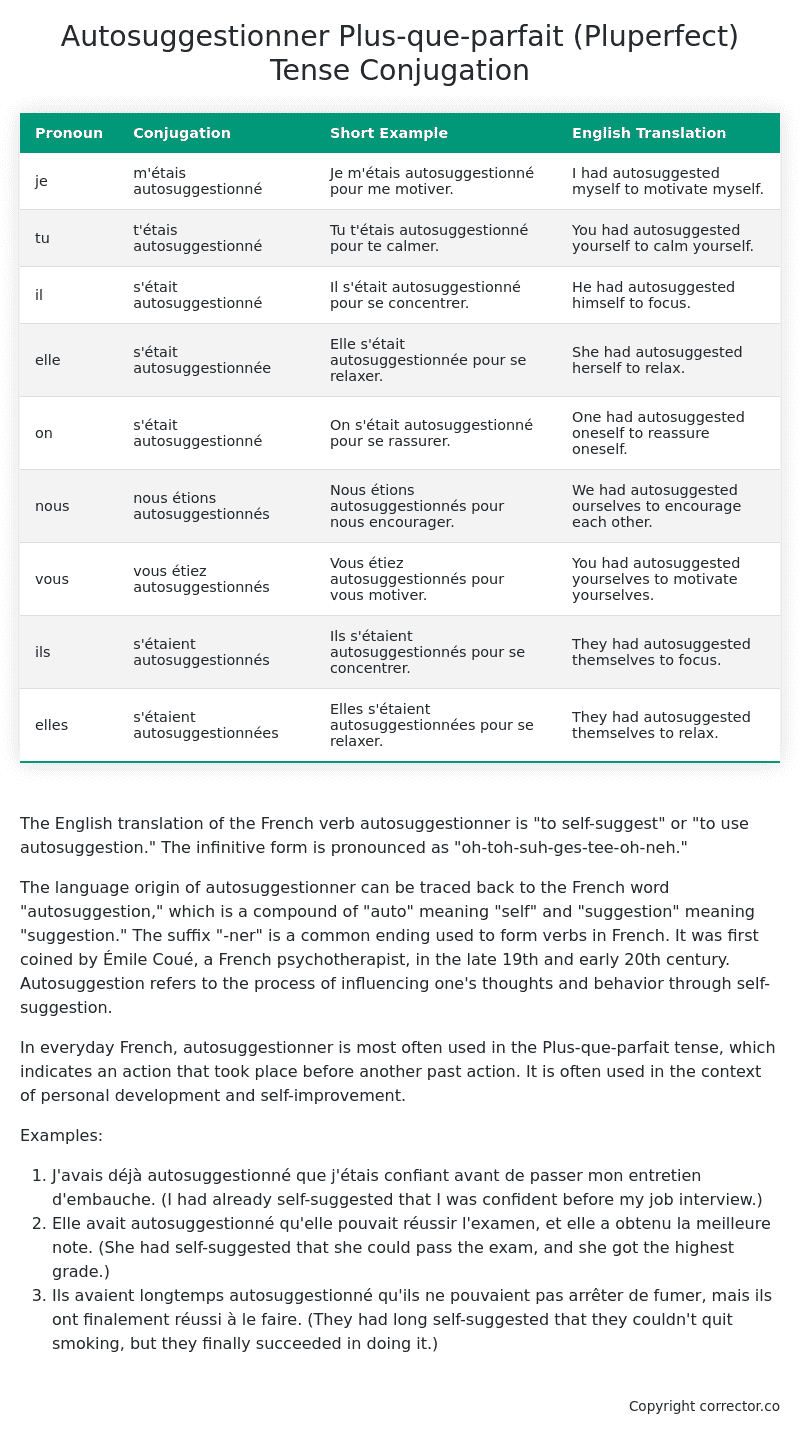Plus-que-parfait (Pluperfect) Tense Conjugation of the French Verb autosuggestionner
Introduction to the verb autosuggestionner
The English translation of the French verb autosuggestionner is “to self-suggest” or “to use autosuggestion.” The infinitive form is pronounced as “oh-toh-suh-ges-tee-oh-neh.”
The language origin of autosuggestionner can be traced back to the French word “autosuggestion,” which is a compound of “auto” meaning “self” and “suggestion” meaning “suggestion.” The suffix “-ner” is a common ending used to form verbs in French. It was first coined by Émile Coué, a French psychotherapist, in the late 19th and early 20th century. Autosuggestion refers to the process of influencing one’s thoughts and behavior through self-suggestion.
In everyday French, autosuggestionner is most often used in the Plus-que-parfait tense, which indicates an action that took place before another past action. It is often used in the context of personal development and self-improvement.
Examples:
- J’avais déjà autosuggestionné que j’étais confiant avant de passer mon entretien d’embauche. (I had already self-suggested that I was confident before my job interview.)
- Elle avait autosuggestionné qu’elle pouvait réussir l’examen, et elle a obtenu la meilleure note. (She had self-suggested that she could pass the exam, and she got the highest grade.)
- Ils avaient longtemps autosuggestionné qu’ils ne pouvaient pas arrêter de fumer, mais ils ont finalement réussi à le faire. (They had long self-suggested that they couldn’t quit smoking, but they finally succeeded in doing it.)
Table of the Plus-que-parfait (Pluperfect) Tense Conjugation of autosuggestionner
| Pronoun | Conjugation | Short Example | English Translation |
|---|---|---|---|
| je | m’étais autosuggestionné | Je m’étais autosuggestionné pour me motiver. | I had autosuggested myself to motivate myself. |
| tu | t’étais autosuggestionné | Tu t’étais autosuggestionné pour te calmer. | You had autosuggested yourself to calm yourself. |
| il | s’était autosuggestionné | Il s’était autosuggestionné pour se concentrer. | He had autosuggested himself to focus. |
| elle | s’était autosuggestionnée | Elle s’était autosuggestionnée pour se relaxer. | She had autosuggested herself to relax. |
| on | s’était autosuggestionné | On s’était autosuggestionné pour se rassurer. | One had autosuggested oneself to reassure oneself. |
| nous | nous étions autosuggestionnés | Nous étions autosuggestionnés pour nous encourager. | We had autosuggested ourselves to encourage each other. |
| vous | vous étiez autosuggestionnés | Vous étiez autosuggestionnés pour vous motiver. | You had autosuggested yourselves to motivate yourselves. |
| ils | s’étaient autosuggestionnés | Ils s’étaient autosuggestionnés pour se concentrer. | They had autosuggested themselves to focus. |
| elles | s’étaient autosuggestionnées | Elles s’étaient autosuggestionnées pour se relaxer. | They had autosuggested themselves to relax. |
Other Conjugations for Autosuggestionner.
Le Present (Present Tense) Conjugation of the French Verb autosuggestionner
Imparfait (Imperfect) Tense Conjugation of the French Verb autosuggestionner
Passé Simple (Simple Past) Tense Conjugation of the French Verb autosuggestionner
Passé Composé (Present Perfect) Tense Conjugation of the French Verb autosuggestionner
Futur Simple (Simple Future) Tense Conjugation of the French Verb autosuggestionner
Futur Proche (Near Future) Tense Conjugation of the French Verb autosuggestionner
Plus-que-parfait (Pluperfect) Tense Conjugation of the French Verb autosuggestionner (this article)
Passé Antérieur (Past Anterior) Tense Conjugation of the French Verb autosuggestionner
Futur Antérieur (Future Anterior) Tense Conjugation of the French Verb autosuggestionner
Subjonctif Présent (Subjunctive Present) Tense Conjugation of the French Verb autosuggestionner
Subjonctif Passé (Subjunctive Past) Tense Conjugation of the French Verb autosuggestionner
Subjonctif Imparfait (Subjunctive Imperfect) Tense Conjugation of the French Verb autosuggestionner
Conditionnel Présent (Conditional Present) Tense Conjugation of the French Verb autosuggestionner
Conditionnel Passé (Conditional Past) Tense Conjugation of the French Verb autosuggestionner
L’impératif Présent (Imperative Present) Tense Conjugation of the French Verb autosuggestionner
L’infinitif Présent (Infinitive Present) Tense Conjugation of the French Verb autosuggestionner
Struggling with French verbs or the language in general? Why not use our free French Grammar Checker – no registration required!
Get a FREE Download Study Sheet of this Conjugation 🔥
Simply right click the image below, click “save image” and get your free reference for the autosuggestionner Plus-que-parfait tense conjugation!

Autosuggestionner – About the French Plus-que-parfait (Pluperfect) Tense
Tense Formation
Common everyday usage patterns
Sequencing of past events
Background information
Hypothetical or reported speech
Interactions with other tenses
Summary
I hope you enjoyed this article on the verb autosuggestionner. Still in a learning mood? Check out another TOTALLY random French verb conjugation!


